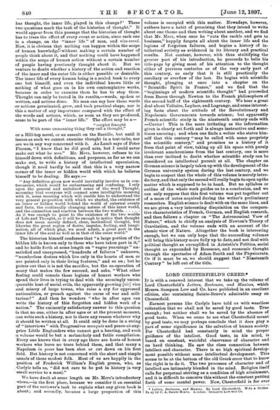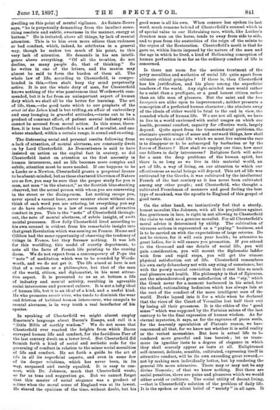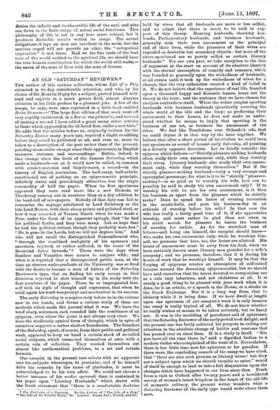LORD CHESTERFIELD'S CREED.* IT is with a renewed interest that
we take up the volume of Lord Chesterfield's Letters, Sentences, and Maxims, which Messrs. Sampson Low and Co. have published in an excellent edition, also containing Sainte-Beuve's admirable essay on Chesterfield.
Earnest persons like Carlyle have told us with weariless reiteration that we shall not be saved by good taste. True enough ; but neither shall we be saved by the absence of good taste. When we come to see what Chesterfield meant by good taste, we may perhaps conclude that it does play a part of some significance in the salvation of human society. For Chesterfield had constantly in mind the proper guidance of the intellect. Good taste, in his mind, is based on constant, watchful observance of character and on hard thinking. He saw the close connection between intellect and character. There is no high spiritual develop- ment possible without some intellectual development. This seems to be at the bottom of the old Greek error that to know the right is to do it. The two processes of character and of intellect are intimately blended in the mind. Religion itself calls for perpetual striving as a condition of high attainment, and it is difficult to conceive this without the constant putting forth of some mental power. Now, Chesterfield is for ever
• Lettrrs, Sentences, and MaTi7111% By Lord Chesterfield. W.tli a Critica Ea ay by C. A. Sainte-Benve. Lundon: tlampson Low and Co. dwelling on this point of mental vigilance. As Sainte-Beuve says, "he is perpetually demanding from the intellect some- thing resolute and subtle, sweetness in the manner, energy at bottom." He is irritated, above all things, by lack of mental attention. This is to him even more odious than rudeness or bad conduct, which, indeed, he attributes in a general way, though he makes too much of his point, to this very lack of attention. He demands in his son intelli- gence above everything. "Of all the troubles, do not decline, as many people do, that of thinking." So he writes in one of the letters, and the maxim may almost be said to form the burden of them all. The whole law of life, according to Chesterfield, is compre- hended in this,—thou shalt keep thy mind perpetually active. It is not the whole duty of man, for Chesterfield knows nothing of the wise passiveness that Wordsworth com- manded, but it is far from an unimportant aspect of human duty which we shall all be the better for learning. The art of life, then,—the good taste which to our prophets of the ernst ist das Leben kind is but trifling, an affair of embroidery and easy lounging in graceful attitudes,—turns out to be a product of constant effort, of patient mental industry which cannot be severed from moral action. In this sense, there- fore, it is true that Chesterfield is a sort of moralist, and one whose standard, within a certain range, is sound and exacting.
The distressing social and personal results following from a lack of attention, of mental alertness, are constantly dwelt on by Lord Chesterfield. As Demosthenes is said to have insisted on action as the capital fact in oratory, so did Chesterfield insist on attention as the first necessity in human intercourse, and as life becomes more complex and subtle, attention must be more needed. If one happens to be a Locke or a Newton, Chesterfield grants a perpetual license to be absent-minded, but as these chartered libertines of Nature are so few, you may be sure that the proper study for you is man, not man "in the abstract," as the Scottish blue-stocking observed, but the actual person with whom you are conversing in the street or the dining-room. Let nothing escape you, never spend a vacant hour, never saunter about without aim, think of each word you are uttering, let everything you say or do have reference to a law of reason and of attractive conduct in you. This is the "note" of Chesterfield through- out, the note of mental alertness, of subtle insight, of swift mental processes. How fully Chesterfield lived according to his own counsel is evident from his remarkable insight into that great Revolution which was coming on France. Hume and Gibbon had the same opportunity of observing the tendency of things in France, but they foresaw nothing. It was left or this worldling, this model of courtly deportment, to note all the facts of French life pointing to the coming doom. We do not expect from a contemporary of Pope the
note" of meditation which was to be sounded by Words- worth, and we do not get it. The life aimed at here is not that of a recluse or a philosopher, but that of the man of the world, citizen, and diplomatist, in his most attrac- tive aspect. It is presented to us as at bottom a life of industry and mental activity, resulting in agreeable social intercourse and personal culture. It is not a lofty ideal of human life, but it is an ideal of a kind, and a useful kind. He who promotes savoir vivre, who tends to diminish the wear and friction of habitual hum an intercourse, who compels to mental alertness, is in very truth a real benefactor of his species.
In speaking of Chesterfield we might almost employ Emerson's language about Bacon's Essays, and call it a "little Bible of earthly wisdom." We do not mean that Chesterfield ever reached the heights from which Bacon surveyed human life and conduct, for the fastidious Peer of the last century dwelt on a lower level. But Chesterfield did furnish forth a kind of social and msthetic code for the governing of conduct in relation to the minor social moralities of life and conduct. He set forth a guide to the art of life in all its superficial aspects, and even in some few of its deeper relations, which has never been, in its way, surpassed and rarely equalled. It is easy to cen- sure, with Dr. Johnson, much that Chesterfield wrote, so far as tone and suggestion go. But we cannot forget that this master of social elegance was a product of a lime when the moral sense of England was at its lowest. He shared the cynicism of the time, without doubt, but his good sense is all his own. When censure has spoken its last word, much remains behind of Chesterfield's counsel which is of special value to our Hebraising race, which, like Luther's drunken man on the horse, tends to sway from side to side, and to pass from the austerities of the reign of the saints to the orgies of the Restoration. Cheeter6eld's merit is that he gave us, within limits imposed by the nature of the man and the age in which he lived, a kind of Hellenising conception of human perfection in so far as the ordinary conduct of life is concerned.
Is there not room for the serious treatment of the petty moralities and aesthetics of social life quite apart from ultimate ethical principles ? If there is, then Chesterfield has his justification, and his place among the superficial teachers of the world. Any right-minded man would rather be a saint than a profligate, or a good honest citizen rather than an idle man of pleasure. But the saint and the bon bourgeois are alike open to improvement ; neither presents a conception of a perfected human character ; the absolute sway of the ideals of either would be fatal to the end in view, the rounded whole of human life. We are not all spirit, we have to live in a world environed with social usages on which our health, personal comfort, capacity for effective work, largely depend. Quite apart from the transcendental problems, the obstinate questionings of sense and outward things, how shall we regulate this s vial life which we must live unless the race is to disappear or to be submerged by barbarism or by the forces of Nature ? How shall we employ our time, how meet our fellows in daily intercourse ? Religious faith will solve for a man the deep problems of the human spirit, but there is, so long as we live in this material world, an art of life, a way of living, on our attention to which our effectiveness as social beings will depend. This art of life was cultivated by the Greeks, it was cultivated by the intellectual French of the last century as it has never been cultivated among any other people ; and Chesterfield, who thought a cultivated Frenchman of manners and good feeling the best type of mankind, was the apostle to England of this gospel of good taste.
On the other hand, we instinctively feel that a sturdy, honest moralist like Johnson, with all his prejudices against fine gentlemen in lace, is right in not allowing to Chesterfield the claim to rank as a genuine moralist. For all Chesterfield's moral advice is determined by utility. The cultivation of virtuous actions is represented as a " paying " business, and is to be carried on with the expectations of large returns. Do not be vicious, for it will ruin your health; be attentive to great ladies, for it will ensure you promotion. If you attend to the thousand and one details of social life, you will gain consideration, you will mount the diplomatic ladder with firm and rapid steps, you will get the utmost physical satisfaction out of life. Chesterfield remembers his own early debauchery not with any sting of conscience, but with the purely mental conviction that it cost him so much real pleasure and health. His philosophy is that of Epicurus, not the misunderstood gross satisfaction of the "sty," which the Greek never for a moment harboured in his mind, but the refined, rationalising hedonism which has always lain at the root of the conduct of the more intelligent men of the world. Burke lapsed into it for a while when he declared that the vices of the Court of Versailles lost half their evil by losing all their grossness. It is the ethics of the '• good sense" which was supposed by the Parisian salons of the last century to be the final expression of human wisdom. As for eternal mysteries, it says, as for the raptures of pious souls, for the heavenly speculation of Platonic reason, we have renounced all that, for we know not whether it is solid reality or the veriest moonshine. But here is actual life to be rendered more graceful and lees boorish ; let us trans- mute its ignobler lusts to a degree of elegance in which they shall scarcely appear as lusts at all. Enlightened self-interest, delicate, sensible, cultivated, expressing itself in attractive conduct, will be its own exceeding great reward,— not by making men individually better, but by rendering the general life more attractive. There may or may not be any divine Nemesis ; of that we know nothing. But there are social penalties, there are pains and pleasures which we would either avoid or cultivate. The social utility of decent living, —that is Chesterfield's solution of the problem of daily life. It is the spoken or silent belief of " society " in all ages. It
denies the infinite and inexhaustible life of the soul, and pine one down to the finite range of actual social functions. This philosophy of life is not in any true sense ethical, but it produces desirable results within its range. The actual obligations it lays on men are excellent in the main, but the motives urged will not provide an ethic, the "categorical imperative" is not there. Had we the fine taste of the best man of the world wedded to the spiritual life, we should have the true human combination for which the world still waits,— the anion of the sons of Zion with the sons of Greece.




































 Previous page
Previous page